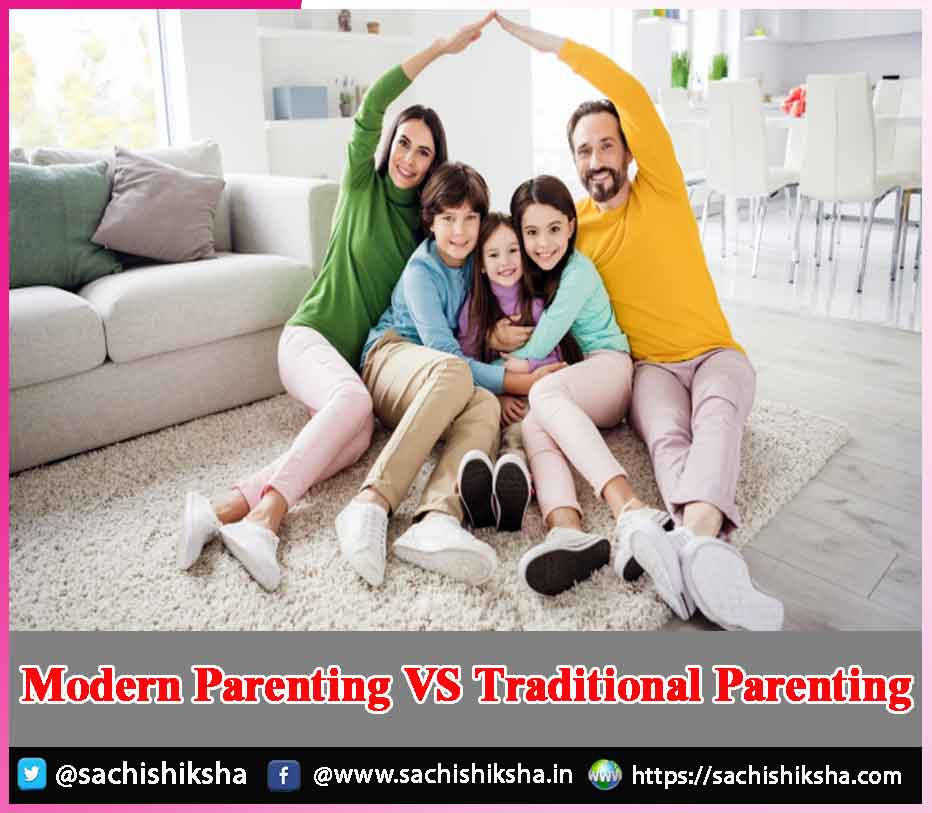Modern Parenting VS Traditional Parenting
Introduction: Parents have a significant part in their children’s education. In terms of literacy and independence, parenting today differs greatly from traditional parenting.
Table of Contents
Teaching:
Initial and foremost, the techniques utilized by parents for instructing their children have changed over time. In modern times, parents are not overly stringent in educating their children. For example, they prefer to employ psychological approaches such as giving guidance and allowing youngsters to engage in thought. Traditional parents, on the other hand, are harsher when it comes to teaching their children. Thus, modern parenting is more permissive than traditional parenting.
Granting Independence:

As a result, children were more obedient and supervised in previous decades. In result, parents today are more indulgent towards their children than parents in years gone by. In simple terms, modern and traditional parents have different perspectives on education and independence. When disciplining their children, parents should be firmer with them and avoid spoiling them.
Strike the Balance between Two Methods:
So there can be absolutely no question that our parents’ conventional technique was excellent. But because of our lifestyle modifications, technology advances, and all of the improvements in our immediate surroundings, the world impacts our lives as well. We cannot raise modern-day children using only old generation approaches. We must strike equilibrium between conventional and modern parenting methods.
We can use the instance of a 6-year-old girl, who can be tough to get along with at times, but her guardians don’t employ the typical method of being harsh with her or punishing her, as they used to hear from their parents. Parents prefer rewarding her for whatever she does rather than punishing her for the errors that she makes or the issues she does not do. I hope the foregoing points make it evident to all individuals that the parents prefer favorable parenting strategies to rigorous parenting methods.
Traditional Parenting
Traditional parenting is fundamentally about being warm and kind to children while also wielding control over them. The child becomes reliant on them as well as looking eagerly for supporting them in all activities and responsibilities.
The youngsters have been conditioned to be compliant; they are no more than dumb robots, and have not learned much or made any interpretations on their own.
Children grow up to be excellent citizens in the conventional parenting method. The driving premise was that being a respectful kid at home can prepare a person to be a decent citizen. It is an extremely practical method to parenting in which the emphasis is on long-term planning and the larger good.
Many individuals are familiar with the adage, “You ought to learn hard now so that you may obtain an excellent position later.”Parents who anticipate their children to be attentive and accountable are more inclined to exercise authority and influence over them. Parents in this type set additional constraints and limits, and they say no a lot often. In conventional parenting, a NO is a whole sentence. There is no place for compromise. The resistance is useless in the face of rigorous discipline.
The family’s principles and core beliefs are also crucial here. These principles are meant to guide children’s behaviour. Children understand to follow rules at a young age, and they additionally gain insight into the effects of violating rules.
As a result, the guardian becomes the ‘undesirable individuals,’ with everything hard, fixed-minded, disciplinarian, and deficient in comfort and warmth. It is exhausting for parents to continuously put on ‘armour’ and create strict limits, often to the extent of detaching and driving the child off in the form of discipline and instruction. Parents in this type are afraid of sparing the object and spoiling the youngster.
Children raised in this manner develop a mistrust of authoritarian individuals; some develop hesitant and reclusive, having trouble in socializing. Others may go the opposite path and become disobedient, motivated by anxiety and wrath.
Children are unable to adequately nurture an awareness of individuality since their primary point of reference is always a family disciplinary member. They are continuously looking for admiration and rely for their actions on the way other people respond.
We adapted some of the old procedures to the new style and devised some new ones in order to educate the child constructively and develop him into a responsible individual. Please see the following techniques of Parenting:
Modern Parenting
Modern parenting is a methodical approach to parenting that is distinct from conventional parenting in various respects. The priority in modern parenting is on cultivating the declaration of independence, encouraging open dialogue, and employing flexible solutions customized to the child’s specific requirements.
Children, according to modern parents, succeed when they are given the opportunity to think carefully, communicate emotions without restriction, and to arrive at personal decisions. They consider themselves as guides and mentors rather than severe law enforcers.
Modern parents encourage open discussion as well, and they aim to provide an atmosphere of security and encouragement in which their children can share what they believe and how they feel. They believe in an interactive approach to issue resolution and making choices, appreciating their child’s contribution and include them in familial talks.
Modern parenting requires flexible approaches as well. Each child, according to modern parents, is distinctive and demands individualized care and consideration. They are willing to try new tactics and modify their methods as their child’s requirements evolve. Mental wellness is not a passing fad here; it is an essential component of modern parenting.
It is a more empathetic strategy that takes into accounts each child’s unique talents, preferences, and requirements. It may be said that it is tailored to each child’s unique personality. Modern parenting aims to produce resilient kids who believe in their own strengths and esteem.
It requires a more comprehensive approach, recognizing the child’s distinctive abilities and attempting to build on them so that they can find an identity in the world and have the capacity to fit in as well as serve.
Children raised in this manner have a higher sense of independence, confidence, and belief in their own talents to face reality. They tend to be less prone to be confused socially.
This style is heavily influenced by parents. They are less strict with regulations and limits and can find another way to approach an event or try figure out why a child reacts in the manner in which they behave. This approach promotes children to respect (and trust) authoritative figures rather than fear them. Children are encouraged to experiment, play, and explore new things. It does not involve punishing, alarming, or humiliating a child for failing to achieve something. It’s about praising them for their efforts and discovering methods to pique their attention.
As is frequently stated, balance is essential in all aspects of life. Concerning over every little thing may give rise to over-involvement, which can seem smothering to the child. This is usually referred to as helicopter parenting. Overpowering a child with screams and breakdowns doesn’t count as love, and it is destructive to the child.
There is no one parenting style that is both flawless and simple. Species grow in nature by picking the strongest and fittest qualities and carrying them on to the next generation. So, when it comes to childcare approaches, we can do the same. Be specific, and be ready to change with each generation.
Conclusion
What is true is that the world is changing, and we must adapt our parenting styles to keep up. Parenting Edition 0.1 may continue to be applicable in today’s society. We require a revision, restart, and reload to Version 4.5. We are also gaining greater understanding and awareness, which we may carefully employ in the right amounts to make parenting easier.
A greater amount of focus has been placed on the child, particularly in modern parenting, and we are witnessing a rise in parental leave and maternity leave, as well as government assistance for parents. Many governments and businesses also play their part to assist parents.














































